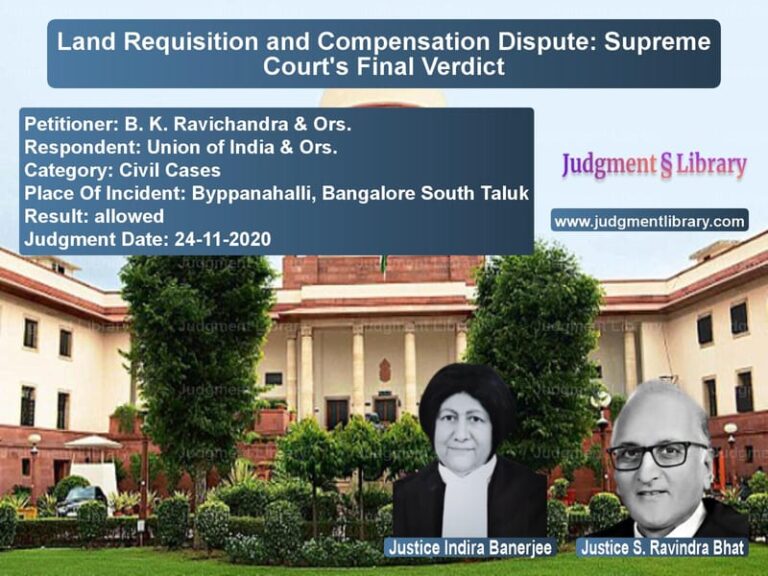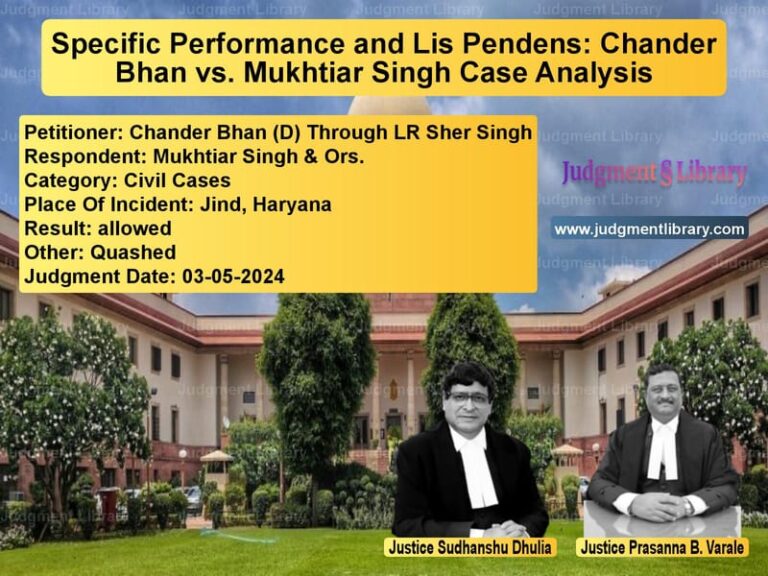Supreme Court Upholds Rape Conviction: No Corroboration Needed if Prosecutrix’s Testimony is Trustworthy
The Supreme Court of India recently upheld the conviction of the appellant in the case of Lok Mal @ Loku v. The State of Uttar Pradesh. The judgment reinforces the well-established principle that the sole testimony of the prosecutrix is sufficient for conviction in rape cases if it is found to be credible and trustworthy. The case, dating back to 1984, has finally reached its conclusion with the apex court affirming the High Court’s decision to convict the accused under Section 376 and Section 323 of the Indian Penal Code (IPC).
Background of the Case
The case stems from an incident that took place on March 19, 1984. The prosecutrix, a young woman pursuing her studies, went to the house of the accused for tuition classes for two young girls. While she was alone in a room on the first floor, the accused allegedly locked the door and forcibly raped her.
According to the prosecution:
- The prosecutrix attempted to raise an alarm but was gagged with a piece of cloth.
- The accused forcibly undressed her and committed rape.
- The girls, who had left the room earlier, returned and knocked on the door, but the accused did not open it.
- The prosecutrix was later rescued by the girls’ grandmother.
- She narrated the incident to her family but initially refrained from filing a report due to threats from the accused’s family.
- Eventually, a written complaint was lodged, leading to the registration of an FIR under Sections 376, 323, 504, and 506 of the IPC.
Trial Court and High Court Proceedings
The accused pleaded not guilty and claimed that he had been falsely implicated due to personal enmity. However, based on the evidence presented, the trial court convicted him and sentenced him to:
- 5 years rigorous imprisonment under Section 376 IPC.
- 6 months rigorous imprisonment under Section 323 IPC.
The High Court of Judicature at Allahabad later upheld the conviction on July 22, 2010, dismissing the appeal filed by the accused.
Petitioner’s (Accused’s) Arguments
The appellant challenged the High Court’s decision in the Supreme Court, arguing that:
- The testimony of the prosecutrix was unreliable as it was not corroborated by medical evidence.
- The prosecutrix had fabricated the allegations due to personal enmity.
- There were no visible injury marks on the prosecutrix, which raised doubts about the occurrence of the alleged rape.
- The delay in lodging the FIR indicated that the case was concocted.
- The character of the prosecutrix’s mother was questionable, which could indicate an ulterior motive behind the allegations.
Respondent’s (State of Uttar Pradesh’s) Arguments
The State of Uttar Pradesh, representing the prosecution, defended the High Court’s ruling, arguing that:
- The testimony of the prosecutrix was consistent, reliable, and inspired confidence.
- Medical evidence is not mandatory for proving rape if the testimony of the prosecutrix is credible.
- There was no substantial reason to doubt the prosecutrix’s account.
- The absence of injuries does not necessarily disprove rape, especially when the victim is overpowered and threatened.
- The alleged delay in lodging the FIR was sufficiently explained, as the prosecutrix and her family were under threats from the accused.
Supreme Court’s Analysis and Key Observations
The Supreme Court analyzed the arguments presented and dismissed the appeal, reiterating that:
1. Testimony of the Prosecutrix is Sufficient for Conviction
“The evidence of the prosecutrix is wholly trustworthy, unshaken, and inspires confidence. Admittedly, the prosecutrix was a major girl studying in the first part of B.A. at the time of the incident. She stood firm and unshaken in cross-examination, disclosing the incident in detail.”
The Court reiterated that the sole testimony of a rape survivor does not require corroboration if found credible.
2. Absence of Injuries is Not Fatal to the Prosecution’s Case
“Merely because in the medical evidence, there are no major injury marks, this cannot be a reason to discard the otherwise reliable evidence of the prosecutrix. It is not necessary that in each and every case where rape is alleged, there has to be an injury to the private parts of the victim.”
3. Delay in Lodging the FIR Was Explained
The Court acknowledged the delay in filing the FIR but found it justified, given that the prosecutrix was under threat and feared for her safety.
4. Character Assassination of the Victim’s Family is Irrelevant
“The question of conviction of the accused for rape of the prosecutrix is independent and distinct. It has absolutely no connection with the character of the mother of the prosecutrix and seems to be a dire attempt at using it as a license to discredit the testimony of the prosecutrix.”
Key Precedents Considered
The Court relied on several precedents, including:
- State of Punjab v. Gurmit Singh (1996) 2 SCC 384: Courts should not insist on corroboration if the prosecutrix’s testimony is credible.
- Bharwada Bhoginbhai Hirjibhai v. State of Gujarat (1983) 3 SCC 217: A victim’s testimony should not be viewed with suspicion unless there are compelling reasons.
Final Judgment
The Supreme Court upheld the High Court’s ruling and dismissed the appeal, stating:
“Guided by law as aforesaid and applying it to the facts and circumstances of the present case, we find no reason to interfere with the judgment of the High Court which is hereby affirmed. The appeal is dismissed accordingly.”
Implications of the Judgment
- Strengthening Rape Laws: The ruling affirms that a victim’s testimony, if found credible, is sufficient for conviction.
- Rejecting Character Assassination: The decision reiterates that a victim’s background or family history has no bearing on the veracity of her claims.
- Importance of Timely Execution: The Court directed authorities to consider the accused’s case for remission as per state policy.
Conclusion
The Supreme Court’s ruling in this case is a landmark decision reinforcing the legal principle that a rape victim’s testimony is sufficient for conviction if credible. The judgment ensures that survivors of sexual assault are not subjected to unnecessary corroboration requirements and that their claims are treated with the seriousness they deserve.
Petitioner Name: Lok Mal @ Loku.Respondent Name: The State of Uttar Pradesh.Judgment By: Justice Sandeep Mehta, Justice Prasanna B. Varale.Place Of Incident: Uttar Pradesh.Judgment Date: 07-03-2025.
Don’t miss out on the full details! Download the complete judgment in PDF format below and gain valuable insights instantly!
Download Judgment: lok-mal-@-loku-vs-the-state-of-uttar-p-supreme-court-of-india-judgment-dated-07-03-2025.pdf
Directly Download Judgment: Directly download this Judgment
See all petitions in Rape Cases
See all petitions in Bail and Anticipatory Bail
See all petitions in Judgment by Sandeep Mehta
See all petitions in Judgment by Prasanna Bhalachandra Varale
See all petitions in dismissed
See all petitions in supreme court of India judgments March 2025
See all petitions in 2025 judgments
See all posts in Criminal Cases Category
See all allowed petitions in Criminal Cases Category
See all Dismissed petitions in Criminal Cases Category
See all partially allowed petitions in Criminal Cases Category







